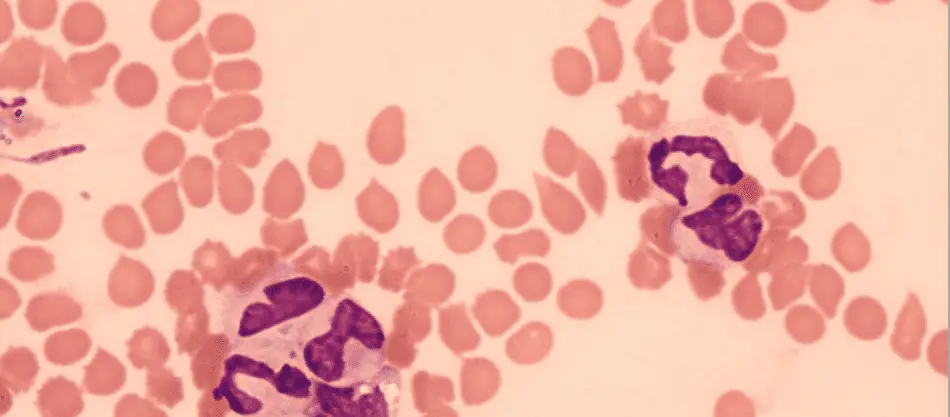The immune system reacts defensively to infections by releasing white blood cells to fight the infection. A fever is the classic sign of the immune system responding normally to infection. Fevers in dogs and humans indicate white blood cells are doing what they are supposed to do–producing inflammatory conditions in which a bacteria or virus cannot survive.
When the immune system attacks itself instead of the infection, it’s usually due to the absence or defectiveness of the PD-L1 and/or PD-1 genes. If a dog’s immune system attacks healthy tissues, symptoms of autoimmune disease emerge that share the following characteristics:
- Recurring fevers
- Skin inflammation (rashes, hives, hair loss)
- Swollen lymph glands
- Joint swelling/pain/stiffness
- Gastrointestinal issues (diarrhoea, constipation, vomiting, abdominal pain)
- Weakness/fatigue/lethargy
- Anaemia
Dogs that inherit faulty major histocompatibility complex (MHC) genes could be at risk of numerous canine autoimmune diseases. Found in all vertebrates, MHC genes are responsible for selecting molecules (antigens) that produce antibodies. Without enough antibodies, the immune response to infection is inadequate. When MHC genes don’t function normally, the canine immune system may begin attacking itself.
Veterinarians think another cause of dog immune system disorder is psychological, physical, or medical stress. Animal and human studies examining the impact of stress on the immune system have found general stress triggers the release of stress-related chemicals.
Excess cortisol especially seems to promote the development of autoimmune diseases. In addition, these studies discovered that eight out of 10 individuals with an autoimmune disorder experienced psychological stress prior to the diagnosis. It is likely a stressed dog may also develop an autoimmune disorder if the stress is not removed.
There is ongoing research investigating the possibility of vaccines, certain medications, food chemicals, and ticks causing a dog immune system disorder. These studies remain, for the most part, inconclusive. However, there is enough anecdotal evidence to warrant further examination of non-genetic causes of canine autoimmune diseases.
What is the Most Common Autoimmune Disease in Dogs?
Pemphigus
Pemphigus foliaceous is the most common dog immune system disorder. By attacking skin proteins in the dog’s epidermis, pemphigus causes severe skin irritation. Examining samples of skin cells (cytology) is the standard method used by veterinarians to diagnose canine pemphigus. Cytology also allows veterinarians to rule out other skin diseases that present similar symptoms to pemphigus.
Symptoms of pemphigus include:
- Skin pustules that quickly develop into crusty lesions and erosions (sores without hair growth)
- Pus-filled lesions that appear mostly on the footpads, face, and body
- Intensely itchy skin (pruritus)
- Fever
- Weight loss
Treatment for pemphigus consists of giving the dog corticosteroids such as prednisone or other steroids. When canine pemphigus resists treatment, veterinarians often prescribe immunosuppressive medication in addition to prednisone. Side effects of corticosteroid use in dogs should be closely monitored by the dog’s owner and reported to the vet if they become severe.
Corticosteroid side effects include:
- Panting
- Hair loss (alopecia)
- Excessive thirst
- Increased appetite
- Atrophy of claws
- Visible discomfort during urination
Veterinarians diagnose one of three ways pemphigus provokes the canine immense system into attacking itself. Determining which form of pemphigus is affecting a dog typically requires additional lab tests and diagnostic imaging scans:
Endogenous pemphigus: something abnormal within the immune system causes the disease
Idiopathic pemphigus: the exact, underlying reason for pemphigus cannot be found
Exogenous pemphigus: an external stimulus triggers an inflammatory reaction within the dog that also causes pemphigus
Treatment success rates for pemphigus are variable, with recent studies finding 52 per cent of cases resulting in complete remission and 35 per cent in partial remission. Dogs who survive pemphigus beyond 10 months usually have positive, long-term outcomes. Most dogs with pemphigus will need lifelong treatment with corticosteroids to control the disease and prevent worsening symptoms.
Certain breeds appear to be prone to pemphigus, such as the Chow, Akita, Shar-pei, and Dachshund. This vulnerability to pemphigus is attributed to certain mutations within the breed’s genome.
Can Autoimmune Disease be Cured in Dogs?
Currently, there is no cure for canine autoimmune diseases. Veterinarians develop unique treatment plans that address a dog’s specific autoimmune disease and symptoms. Owners of dogs with autoimmune disorders will need to ensure their dog takes medication as prescribed by the vet. They may also need to make changes to the dog’s diet and continuously monitor their dog’s health for signs of worsening symptoms.
In addition to regular lab tests and examinations, some dogs may require occasional blood transfusions if they develop severe anaemia or bleed extensively from the gums and other mucous membranes. In some cases, the dog’s spleen may be removed if other treatments are not working to control bleeding symptoms.
An example of a common autoimmune disease in dogs that isn’t curable but often goes into long periods of remission in inflammatory bowel disease (IBD). Like human IBD, canine IBD causes vomiting, weight loss, hair loss, chronic diarrhoea, and bloody stools. Veterinarians aren’t sure what causes IBD in dogs but think it’s due to cellular miscommunication between a dog’s immune system and the intestines.
Infections, food allergies, parasites, and other common causes of canine intestinal inflammation must be ruled out before diagnosing canine IBD. Veterinarians often start the dog on a series of antibiotics to treat IBD symptoms. If antibiotics do not reduce symptoms, vets may perform an intestinal biopsy to determine if lesions or tumours are responsible for IBD-like symptoms.
Treatment involves antibiotics or prednisone if antibiotics aren’t effective enough. Owners of dogs with IBD will need to modify the dog’s diet and make sure the dog is drinking enough fluids to prevent dehydration. Supplementing water with an electrolyte replacement is recommended. Vitamin B12 is sometimes prescribed by vets for dogs that have developed a B12 deficiency due to IBD. B12 is essential for the nervous system, heart, and cellular health in dogs. Once medications start stabilizing the dog’s condition, the risk of malnutrition and dehydration significantly decreases. Dogs that respond well to medications may not need to continue taking B12 supplements.
Another dog immune system disorder that can be successfully managed with medication is autoimmune thyroiditis (AT). When the immune system attacks the dog’s thyroid, symptoms of hypothyroidism emerge once 75 per cent of the thyroid gland is damaged. Lethargy, weakness, skin inflammation, increased appetite, and gaining weight are signs of advanced autoimmune thyroiditis. Purebred beagles, Doberman pinschers, and Old English sheepdogs are prone to thyroiditis. Treating this autoimmune disorder involves sodium levothyroxine supplementation until thyroid hormone levels have risen and stabilized. Most dogs react favourably to this treatment and do not need to take immunosuppressive medication.
What is the Life Expectancy of a Dog with Autoimmune Disease?
The prognosis of dogs with canine autoimmune disease depends on several factors: what type of dog immune system disorder is affecting them, the general health of the dog, and how well they respond to treatment. Regardless of the severity of the disease, the dog will require medication, tests, and monthly or bi-monthly check-ups to properly manage the disease. When dogs respond well to treatment, they often live a full life of 10+ years. Less severe autoimmune diseases like pemphigus, hypothyroidism, or irritable bowel disease (IBD) almost always have a good prognosis as long as the dog responds well to medications and dietary changes.

